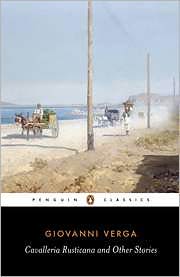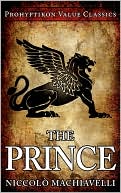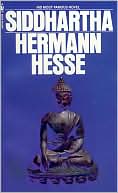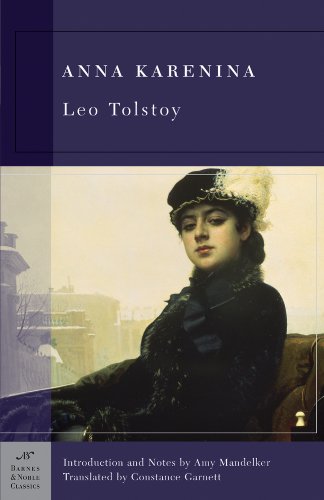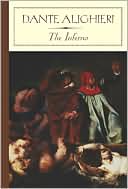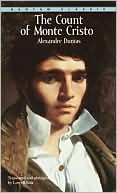Cavalleria Rusticana and Other Stories
A new translation of the stories of Giovanni Verga, the greatest Italian short-story writer since Boccaccio." "Born in 1840 into a well-to-do Sicilian family, in the 1870s Verga became an active observer and habitue of Milanese salon society, but eventually found in the everyday lives of Sicilian peasants the inspiration for his finest narratives. Love, adultery and honour are recurring themes in stories set against the scorched landscapes of the slopes of Mount Etna and the Plain of Catania.
Search in google:
A new translation of the stories of Giovanni Verga, the greatest Italian short-story writer since Boccaccio." "Born in 1840 into a well-to-do Sicilian family, in the 1870s Verga became an active observer and habitue of Milanese salon society, but eventually found in the everyday lives of Sicilian peasants the inspiration for his finest narratives. Love, adultery and honour are recurring themes in stories set against the scorched landscapes of the slopes of Mount Etna and the Plain of Catania.London Review of Books - James WoodD.H. Lawrence, who lived for a while in Sicily, discovered Verga's work with great excitement and translated him in the 1920's, He rightly called "Jeli the Shephard" and another story "Rosso Malpelo" two of the greatest ever written, At his best, as G.H. McWilliam's distinguished new translations of the stories allow us to see, Verga is quite the equal of Chekhov, in the fiercely unsentimental depiction of ordinary rural life, in the coaxing of opaque inner lives, and most of all in his self-smothering ability to see life not as a writer might see it, but entirely from within the minds of his mostly uneducated characters.
The She-Wolf\ She was dark-haired, tall and lean, with firm, well-rounded breasts, though she was no longer young, and she had a pale complexion, like someone forever in the grip of malaria. The pallor was relieved by a pair of huge eyes and fresh red lips that looked as though they would eat you.\ In the village they called her the She-Wolf because, no matter what she had, she was never satisfied. The woman crossed themselves whenever they saw her coming, lone as a stray bitch, with the restless and wary appearance of a starving wolf. She would gobble up their sons and their husbands in the twinkling of an eye with those red lips of hers, and draw them to the tail of her skirt and transfix them with those devilish eyes, as though they were standing before the altar at St Agrippina's. Luckily the She-Wolf herself never set foot inside the church, either at Easter or at Christmas or to hear Mass or to go to confession. Father Angiolino of St Mary of Jesus, a true servant of God, had lost his soul on her account. Maricchia, poor girl, a good and worthy soul, shed tears in secret because she was the She-Wolf's daughter and nobody would ever want to marry her, even though she too had a fine trousseau tucked away in a chest and a patch of decent land in the sun, like any other girl in the village.\ Then it happened that the She-Wolf fell in love with a handsome young fellow back from the army, when the two of them were hay-making on the notary's farm. She'd fallen for him lock, stock and barrel, her flesh burning beneath her thick cotton bodice, and, staring into his eyes, she was overcome with the kind of thirst you would experience down in the valley on a hot midsummer day. But he just kept scything calmly away, head down over the hay, saying "What's the matter, Pina?". In the vast expansive fields, where all you could hear was the chirping of the crickets as they leapt, with the sun beating straight down, the She-Wolf tied up sheaf after sheaf, bundle after bundle, showing no sign of fatigue, never looking up for an instant, never putting her lips to the flask, just so long as she could be there behind Nanni, while he scythed away, asking her every so often, "What is it you want, Pina?".\ One evening she told him, while the men, exhausted from their day's labours, were nodding off to sleep in the barn, and the dogs were filling the dark air of the countryside with their howling, "It's you I want! You that are beautiful as the sun, and sweet as the honey! I want you!".\ "It's the unmarried daughter of yours that I want," Nanni replied, laughing. The She-Wolf thrust her hands into her hair, tearing at the sides of her head without uttering a word, then strode off and stayed away from the barn. But then the olive-crushing season came round in October, she set her eyes on Nanni again because he was working next door to were she lived, and the creaking of the press kept her awake the whole night long.\ "Pick up that sack of olives," she said to her daughter, "and come with me." Nanni was pushing the olives under the mill wheel with his shovel, and shouting "Gee up there!" to the mule to keep it moving.\ "Do you want my daughter Marricchia?" Pina asked.\ "What are you going to give her?" Nanni replied.\ "She's got the things her father left, and she can have my house into the bargain. All you need to leave me is the corner of the kitchen to spread out my palliasse."\ "In that case we can talk it over at Christmas." said Nanni.\ Nanni was covered in grease sweat from the oil and the fermenting olives, and Maricchia wanted nothing whatever to do with him, but when they got home her mother grabbed her by the hair and said to her through clenched teeth: "If you don't take him, I'll kill you!". You would have thought the She-Wolf was ill, and people were saying that when the Devil grows old he goes into hiding. She never wandered about the village any more, she didn't stand on the doorstep flashing those crazy eyes of hers. Her son-in-law, whenever she fixed those eyes on him, began to laugh, and pulled out his scapular to bless himself with. Maracchia stayed at home, breastfeeding the children, while her mother went off to the fields to work alongside the men; just like a man, in fact, digging, hoeing, rounding up the cattle, and pruning the vines in all weather, in January with an icy wind from the east, or August with the sirocco from the south, when at the end of the day the mules would be drooping their heads and the men would be sitting asleep, propped against the wall with their mouths hanging open. 'In hours that run from dusk till dawn goes no good woman ever born,' and Pina was the only living soul you could see out and about, picking her way over the boundless fields that stretched into the heat haze of the far distance towards Etna, shrouded in mist, where the sky bore down on the horizon. "Wake up!" said the She-Wolf to Nanni, who was lying asleep in the ditch under the dust-laden hedgerow, resting his head between his arms. "Wake up, I've brought you some wine to wet your throat."\ Nanni opened his eyes wide, stupefied, still half-asleep, to find her standing over him, white-faced, thrusting her breast towards him and fixing him with her coal-black eyes, and he stretched out his hands, groping the air.\ "No! No good woman's abroad from dusk till dawn!" bewailed Nanni, pressing his face down again into the dry grass of the ditch as hard as he could, with his fingernails tearing at his hair. "Go away! Go away! Keep away from the barn!"\ She did go away, did the She-Wolf, tying up her splendid tresses as she went, staring ahead of her toward the hot fields of stubble with her coal-black eyes.\ But she kept going back to the barn, and Nanni said nothing. In fact, whenever she was late arriving, in the hours that run from dusk till dawn, he would go and wait for her at the top of the ashen-white, deserted lane, with beads of sweat standing out on his forehead. And afterwards he would thrust his hands through his hair and repeat every time, "Go away! Go away! Don't come back to the barn!"\ Maracchia wept day and night, and stared at her mother with tear-filled eyes aflame with jealousy, looking like a wolf-cub herself, every time she saw her returning pale and silent from the fields.\ "You wicked slut!" she cried. "You wicked slut of a mother!"\ "Shut up!"\ "You thief! Thief!"\ "Shut up!"\ "'I'll tell the police sergeant, that's what I'll do!"\ "Go ahead and tell him!"\ She did go ahead, with her children clinging round her neck, totally unafraid, and without shedding a tear. She was like a mad woman, because now she too loved the husband they had forced upon her, all greasy and covered in sweat from the fermenting olives. The sergeant had Nanni called in, and threatened him with prison and the gallows. Nanni stood there sobbing and tearing his hair. He denied nothing, and didn't even try to make excuses. "I was tempted!" he cried. "I was tempted by the Devil!"\ He threw himself at the sergeant's feet, pleading with him to send him to prison.\ "For pity's sake, sergeant, take me out of this hell on earth! Have me killed, send me to prison, never let me set eyes on her again, ever!"\ But when the sergeant spoke to the She-Wolf, she replied, "No! I kept a corner of the kitchen to sleep in, when I gave him my house as a dowry. The house is mine. I don't intend to leave it." Shortly after that, Nanni was kicked in the chest by a mule, and was at death's door. But the parish priest refused to bring him the bread of Christ until the She-Wolf left the house. The She-Wolf went away, and her son-in-law could then prepare to take his leave of the world as a good Christian. He confessed and made communion with such an obvious show of repentance and contrition that all the neighbours and onlookers were in tears at the bed of the dying man. And it would have been better if he had died then and there, before the Devil returned to tempt him and to take him over body and soul as soon as he recovered.\ "Leave me alone!" he said to the She-Wolf. "For God's sake, leave me in peace! I stared death in the face! The poor Maricchia is in despair! The whole village knows all about it! It's better for both of us if I don't see you. . . ."\ He would have liked to tear out his eyes so as not to see the eyes of the She-Wolf, who made him surrender body and soul when she fixed them upon him. He no longer knew what to do to release himself from her spell. He paid for Masses for the souls in Purgatory, and asked the parish priest and the sergeant to help him. At Easter he went to confession, and did penance in public by crawling on his belly for six feet over the cobblestones in front of the church. After all that, when the She-Wolf returned to torment him, he said to her:\ "Listen! Just you stay away from the barn, because if you come looking for me again, I swear to God I'll kill you!"\ "Go ahead and kill me," replied the She-Wolf. "It doesn't worry me. I can't live without you."\ When he saw her coming in the distance, through the sown fields, he stopped digging at the vine with his mattock, and went and wrenched the axe from the elm. The She-Wolf saw him coming, pale with frenzy, the axe glittering in the sun, but she never stopped for a moment or lowered her gaze as she carried on walking towards him, with her hands full of bunches of red poppies, devouring him with her coal-black eyes. "Ah!" Nanni stammered. "May your soul roast in Hell!"
AcknowledgementsIntroductionBibliographyNote on Sicilian TermsNedda1Cavalleria nusticana27The She-Wolf34Picturesque Lives39Jeli the Shepherd46Rosso Malpelo78Gramigna's Mistress93War of the Saints101How, When and Why110The Reverend137Getting to know the King146Don Licciu Papa153Malaria159Property167Black Bread173Bigwigs201Freedom208Springtime217Wolf-hunt227Maps235Notes237
\ James WoodD.H. Lawrence, who lived for a while in Sicily, discovered Verga's work with great excitement and translated him in the 1920's, He rightly called "Jeli the Shephard" and another story "Rosso Malpelo" two of the greatest ever written, At his best, as G.H. McWilliam's distinguished new translations of the stories allow us to see, Verga is quite the equal of Chekhov, in the fiercely unsentimental depiction of ordinary rural life, in the coaxing of opaque inner lives, and most of all in his self-smothering ability to see life not as a writer might see it, but entirely from within the minds of his mostly uneducated characters.\ —London Review of Books\ \
